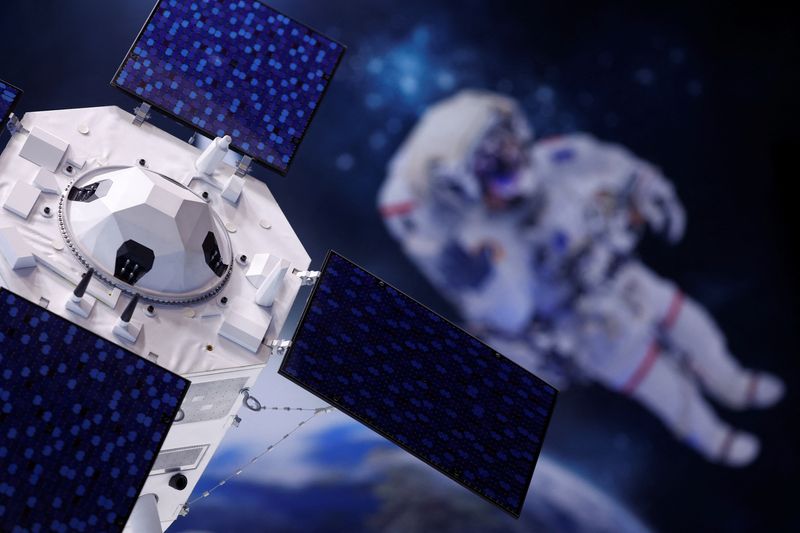China showcases lunar reach as space powers meet without Russia
By Joey Roulette, Giulia Segreti and Tim Hepher
MILAN (Reuters) -China unveiled a rock sample from the moon's far side to a space summit overshadowed by shifting political and commercial rivalries on Monday, with traditional space power Russia absent from the Milan gathering amid tensions with the West.
The International Astronautical Congress (IAC) has been a venue since 1950 for scientists, engineers, companies and politicians of space-faring nations to discuss cooperation, even during the Cold War.
At the latest edition in Milan, the China National Space Administration showcased a rock sample that its Chang’e 6 rover fetched from the moon’s far side - the first such exploit and widely seen as evidence of Beijing’s rising space-power status.
A Chinese official whisked a red blanket off a glass case containing the tiny lunar fragment at a ceremony witnessed by space agency chiefs of Europe, the United States, Japan and elsewhere.
For its part, NASA was displaying rocks that its OSIRIS-REx spacecraft retrieved from the Bennu asteroid in 2023.
"This is the most exciting time in space since the Apollo era in the 1960s," Clay Mowry, president of the 77-nation International Astronautical Federation, the non-profit that organises the annual congress, told Reuters.
Talks were expected to touch heavily on lunar exploration, NASA's growing coalition under its Artemis moon programme and Europe's pressing need for more sovereign access to space.
A record 7,197 technical abstracts have been submitted.
NASA administrator Bill Nelson was expected to use the event to rally support for plans to tap private companies to replace the ageing International Space Station after its 2030 retirement.
The orbiting science laboratory, now more than two decades old, has been a symbol of space diplomacy led primarily by the U.S. and Russia, despite conflicts on Earth.
Russia's space agency Roscosmos, a storied power now isolated from the West after Moscow's 2022 invasion of Ukraine, has no official presence at this year's event, however.
NASA has been investing billions of dollars in its Artemis moonshot but is also keen on maintaining a presence in low-Earth orbit to compete with China's Tiangong space station, which has continuously housed Chinese astronauts for three years.
The U.S. and China are also racing to land the first humans on the moon since the last American Apollo mission in 1972. Both are aggressively courting partner countries and leaning heavily on private companies for their moon programmes, shaping the space objectives of smaller space agencies.
EUROPE'S PRIORITIES
The Oct 14-18 event is the largest in the space calendar and comes as host nation Italy draws up a framework establishing local rules for private investment. It wants similar clarity at a European level, officials said.
A surge in space traffic led by fast-growing satellite constellations like Starlink has raised concerns about space debris collisions and a growing field of other space junk.
"These rules give the national ecosystem guidance on how to reach our objectives and grant the use of space in a sustainable and useful way," Italy's Industry Minister Adolfo Urso said.
Musk's SpaceX is relied upon by much of the Western world for accessing space, driving countries - including the U.S. - to encourage new space upstarts that can offer more affordable rockets. SpaceX's growing Starlink internet network has made the company the world's largest satellite operator.
After a year-long hiatus, Europe regained uncrewed access to orbit with the test flight of its Ariane 6 launcher in July.
Europe's satellite manufacturing industry is facing growing pressures, however, as a once-thriving market for its large, bespoke geostationary satellites shifts towards lower orbit.
Italy's Leonardo, one of the hosts of the week-long event, has called for a new strategy for the space sector embracing its French joint venture partner Thales and their main rival in satellite manufacturing, Airbus.
Industry sources say the three companies are involved in preliminary talks about combining their satellite activities, but much will depend on the attitude of a new European Commission, which blocked past efforts to forge a single player.
Source: Investing.com
